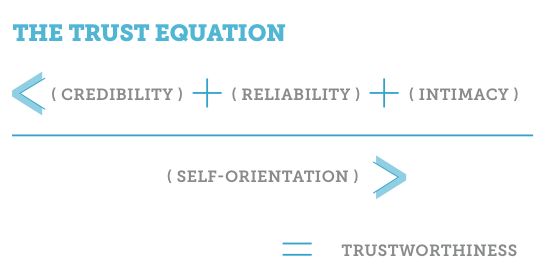The Trust Equation
When we think of trust and what it means, we quickly realize it encompasses many things. We use the word “trust” to:
- Interpret what people say
- Describe behaviors
- Decide if we feel comfortable sharing information
- Indicate whether we feel other people have our interests at heart
The Four Variables
The Trust Equation uses four objective variables to measure trustworthiness. These four variables are best described as: Credibility, Reliability, Intimacy and Self-Orientation.
We combine these variables into the following equation:

TQ stands for Trust Quotient. The Trust Quotient is a number — like your IQ or EQ — that benchmarks your trustworthiness against the four variables.
Let’s dig into each variable a bit more:
- Credibility has to do with the words we speak. In a sentence we might say, “I can trust what she says about intellectual property; she’s very credible on the subject.”
- Reliability has to do with actions. We might say, “If he says he’ll deliver the product tomorrow, I trust him, because he’s dependable.”
- Intimacy refers to the safety or security that we feel when entrusting someone with something. We might say, “I can trust her with that information; she’s never violated my confidentiality before, and she would never embarrass me.”
- Self-orientation refers to the person’s focus. In particular, whether the person’s focus is primarily on him or herself, or on the other person. We might say, “I can’t trust him on this deal — I don’t think he cares enough about me, he’s focused on what he gets out of it.” Or more commonly, “I don’t trust him — I think he’s too concerned about how he’s appearing, so he’s not really paying attention.”
The Trust Equation has one variable in the denominator and three in the numerator.
Increasing the value of the factors in the numerator increases the value of trust. Increasing the value of the denominator — self-orientation — decreases the value of trust.
Self-orientation, which sits alone in the denominator, is the most important variable in the Trust Equation. We developed the formula this way on purpose.
It’s All About People
The Trust Equation covers the most common meanings of trust that you encounter in everyday business interactions. What’s important to remember is that the meanings are almost entirely personal, not institutional.
People rarely give over their trust to institutions; really they trust other people.
While companies are often described as credible and reliable (the first two components of The Trust Equation), it’s really the people within the companies that make those companies what they are. And intimacy and self-orientation are almost entirely about people.
Trust in business requires good “scores” on all four variables in the Trust Equation. You want high credibility, reliability and intimacy, and low self-orientation.
Living the four Trust Values is the best way to increase your trustworthiness. The Trust Equation provides a scientific, analytical and actionable framework for how we help organizations and individuals improve their businesses and lives.
I like this!! It reminds me of a team meeting that I sat through back in Detroit. This would also make a great tool for self-analysis as well.
ReplyDeleteOne thing that hit me is folks do not give their trust to institutions, but to people. The one they know and deal with personally.
ReplyDeleteGood stuff.